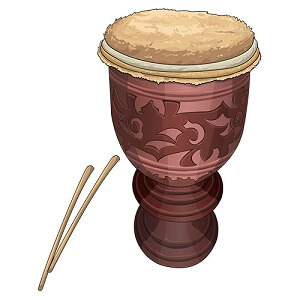Dabakan
 The dabakan is a percussion instrument that originated in the Philippines. It is a single-headed drum that is usually played along with the other instruments in the kulintang ensemble. Interestingly, the dabakan is the only non-gong instrument among the five main instruments in the ensemble.
The dabakan is a percussion instrument that originated in the Philippines. It is a single-headed drum that is usually played along with the other instruments in the kulintang ensemble. Interestingly, the dabakan is the only non-gong instrument among the five main instruments in the ensemble.
According to history, the name dabakan originated and was adapted from the Middle East. This term is derived from the word ‘dbak,’ which means to strike, hit, or beat. In addition to that, some scholars stated that the dabakan might be an adaptation and enlargement of the Arabic’s dombak, or tombak, another type of a goblet drum.
Aside from its known name,’dabakan,’ this single-headed drum was also known as debakan in Maguindanao, dadabooan, as called by the Maranao, and Iibit, as named by the Tausug. Additionally, aside from the Philippines, the dabakan is also known in some of the regions in Indonesia. In fact, in Poso Regency, the dabakan is known as Tibubu, while it is called Tiwal by the ethnic group Minahasans.